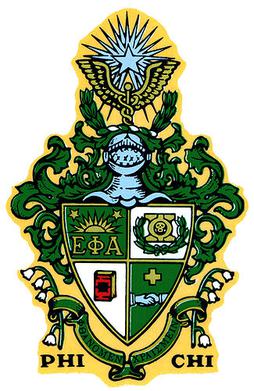Phi Chi
Phi Chi is one of the oldest and largest professional medical fraternities in the world. Founded on March 31, 1889, at the University of Vermont, College of Medicine by Drs. Frederick A. Fernald and William P. Horton, Phi Chi evolved from the merger of two separate medical fraternities, Phi Chi of Vermont (founded in 1889) and Phi Chi of Louisville (founded in 1894 at the Louisville Medical College). The merger in 1905 resulted in a single fraternity with a shared name and mission, marking the beginning of Phi Chi's expansion to medical schools across the United States and abroad.
History[edit | edit source]
The history of Phi Chi is deeply rooted in the tradition of fostering excellence in the medical profession. The fraternity was established to provide a support network for medical students, promoting academic excellence, ethical standards, and camaraderie among its members. Over the years, Phi Chi has expanded significantly. By the early 20th century, it had chapters in numerous medical schools across the United States, and it has since established chapters in other countries, making it an international fraternity.
Mission and Values[edit | edit source]
The mission of Phi Chi revolves around improving medical education, fostering lifelong friendships among medical professionals, and instilling high ethical and professional standards. The fraternity emphasizes the importance of mentorship, community service, and leadership development among its members. Phi Chi's values are exemplified through its commitment to philanthropy, with members actively participating in various community service projects and health-related initiatives.
Membership[edit | edit source]
Membership in Phi Chi is open to medical students, residents, and practicing physicians who demonstrate a commitment to the fraternity's values and mission. The fraternity prides itself on a diverse membership that reflects the broad spectrum of the medical profession. Members benefit from a network of support throughout their medical education and professional careers, with opportunities for leadership, mentorship, and participation in medical and community service projects.
Philanthropy and Community Service[edit | edit source]
Phi Chi members are actively involved in philanthropic activities and community service, reflecting the fraternity's commitment to giving back to the community and improving public health. These activities range from health education programs to free clinics and international medical missions, allowing members to apply their medical knowledge and skills in service to those in need.
Notable Alumni[edit | edit source]
Over the years, Phi Chi has produced a distinguished list of alumni who have made significant contributions to the medical field and beyond. These include leaders in various medical specialties, researchers, educators, and public health officials. The fraternity celebrates the achievements of its members and their impact on improving health care and advancing medical knowledge.
Chapters[edit | edit source]
Phi Chi has chapters at medical schools across the United States and internationally. Each chapter is unique, reflecting the character and interests of its members, but all share the common goals of supporting medical education, fostering camaraderie among members, and contributing to the community through service.
Conclusion[edit | edit source]
Phi Chi stands as a testament to the enduring value of fraternity in the medical profession. Through its commitment to excellence, service, and ethical practice, Phi Chi continues to play a vital role in shaping the future of medicine. The fraternity not only supports its members during their medical education but also fosters a lifelong commitment to professional development, leadership, and community service.
Search WikiMD
Ad.Tired of being Overweight? Try W8MD's physician weight loss program.
Semaglutide (Ozempic / Wegovy and Tirzepatide (Mounjaro / Zepbound) available.
Advertise on WikiMD
|
WikiMD's Wellness Encyclopedia |
| Let Food Be Thy Medicine Medicine Thy Food - Hippocrates |
Translate this page: - East Asian
中文,
日本,
한국어,
South Asian
हिन्दी,
தமிழ்,
తెలుగు,
Urdu,
ಕನ್ನಡ,
Southeast Asian
Indonesian,
Vietnamese,
Thai,
မြန်မာဘာသာ,
বাংলা
European
español,
Deutsch,
français,
Greek,
português do Brasil,
polski,
română,
русский,
Nederlands,
norsk,
svenska,
suomi,
Italian
Middle Eastern & African
عربى,
Turkish,
Persian,
Hebrew,
Afrikaans,
isiZulu,
Kiswahili,
Other
Bulgarian,
Hungarian,
Czech,
Swedish,
മലയാളം,
मराठी,
ਪੰਜਾਬੀ,
ગુજરાતી,
Portuguese,
Ukrainian
Medical Disclaimer: WikiMD is not a substitute for professional medical advice. The information on WikiMD is provided as an information resource only, may be incorrect, outdated or misleading, and is not to be used or relied on for any diagnostic or treatment purposes. Please consult your health care provider before making any healthcare decisions or for guidance about a specific medical condition. WikiMD expressly disclaims responsibility, and shall have no liability, for any damages, loss, injury, or liability whatsoever suffered as a result of your reliance on the information contained in this site. By visiting this site you agree to the foregoing terms and conditions, which may from time to time be changed or supplemented by WikiMD. If you do not agree to the foregoing terms and conditions, you should not enter or use this site. See full disclaimer.
Credits:Most images are courtesy of Wikimedia commons, and templates Wikipedia, licensed under CC BY SA or similar.
Contributors: Prab R. Tumpati, MD

